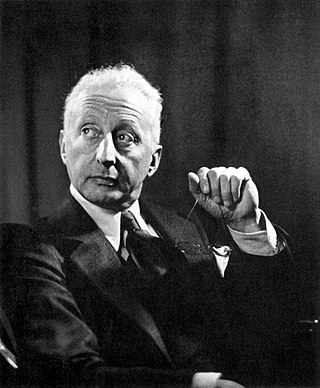
Jerome David Kern was an American composer of musical theatre and popular music. One of the most important American theatre composers of the early 20th century, he wrote more than 700 songs, used in over 100 stage works, including such classics as "Ol' Man River", "Can't Help Lovin' Dat Man", "A Fine Romance", "Smoke Gets in Your Eyes", "The Song Is You", "All the Things You Are", "The Way You Look Tonight" and "Long Ago ". He collaborated with many of the leading librettists and lyricists of his era, including George Grossmith Jr., Guy Bolton, P. G. Wodehouse, Otto Harbach, Oscar Hammerstein II, Dorothy Fields, Johnny Mercer, Ira Gershwin and Yip Harburg.

Otto Abels Harbach, born Otto Abels Hauerbach was an American lyricist and librettist of nearly 50 musical comedies and operettas. Harbach collaborated as lyricist or librettist with many of the leading Broadway composers of the early 20th century, including Jerome Kern, Louis Hirsch, Herbert Stothart, Vincent Youmans, George Gershwin, and Sigmund Romberg. Harbach believed that music, lyrics, and story should be closely connected, and, as Oscar Hammerstein II's mentor, he encouraged Hammerstein to write musicals in this manner. Harbach is considered one of the first great Broadway lyricists, and he helped raise the status of the lyricist in an age more concerned with music, spectacle, and stars. Some of his more famous lyrics are "Smoke Gets in Your Eyes", "Indian Love Call" and "Cuddle up a Little Closer, Lovey Mine".

Ella Swings Brightly with Nelson is a 1962 studio album by the American jazz singer Ella Fitzgerald, accompanied by an orchestra arranged by Nelson Riddle.

Ella Fitzgerald Sings the Jerome Kern Song Book is a 1963 studio album by the American jazz singer Ella Fitzgerald accompanied by an orchestra arranged and conducted by Nelson Riddle. The album focuses on the songs of the composer Jerome Kern.

Blossom Dearie is an album by Blossom Dearie that was recorded in 1956 and released in 1957. It was her first recording for Verve.
"I Won't Dance" is a song with music by Jerome Kern that has become a jazz standard. The song has two different sets of lyrics: the first written by Oscar Hammerstein II and Otto Harbach in 1934, and second written by Dorothy Fields in 1935.

Roberta is a 1935 American musical film released by RKO Radio Pictures and directed by William A. Seiter. It stars Irene Dunne, Fred Astaire, Ginger Rogers, and features Randolph Scott, Helen Westley, Victor Varconi and Claire Dodd. The film was an adaptation of the 1933 Broadway musical Roberta, which in turn was based on the novel Gowns by Roberta by Alice Duer Miller. It was a solid hit, showing a net profit of more than three-quarters of a million dollars.

Soulville is a 1957 album by swing tenor saxophonist Ben Webster, recording a session from October 15, 1957, which Webster played with the Oscar Peterson Trio.
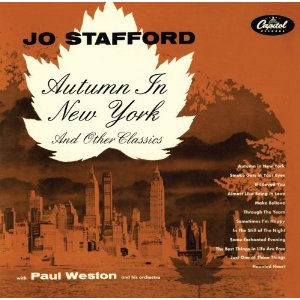
Autumn in New York is a 1950 album by Jo Stafford, with Paul Weston And His Orchestra. It was re-released in 1955 with extra tracks, and in 1997 EMI issued it on a CD along with 1953's Starring Jo Stafford.

The Astaire Story is a 1952 album by Fred Astaire. The album was conceived of and produced by Norman Granz, the founder of Clef Records, who was also responsible for the Jazz at the Philharmonic concerts, at which all of the musicians on the album had performed.
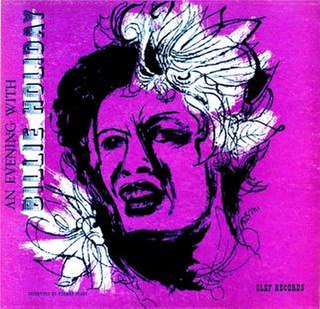
An Evening with Billie Holiday is the second 10-inch LP studio album by jazz singer Billie Holiday, released by Clef Records in 1953.

Margaret Whiting Sings the Jerome Kern Songbook is a 1960 studio album by Margaret Whiting, with an orchestra conducted and arranged by Russell Garcia, focusing on the songs of Jerome Kern. Originally released as a double-LP set by Verve Records in 1960, it was reissued on CD by Universal in Japan and the United States (2002).
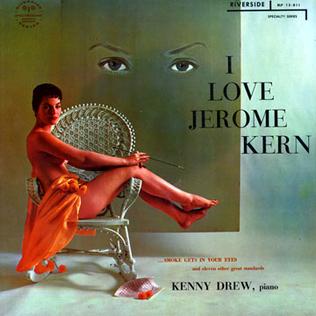
I Love Jerome Kern is an album by pianist Kenny Drew recorded in 1957 and released on the Riverside label. The album was rereleased on CD by Lone Hill Jazz coupled with Drew's Pal Joey as The Complete Jerome Kern / Rodgers & Hart Songbooks in 2008.

Lucky Thompson Plays Jerome Kern and No More is an album led by saxophonist Lucky Thompson recorded in 1963 and released on the Moodsville label.
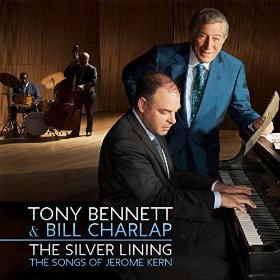
The Silver Lining: The Songs of Jerome Kern is the final studio album by Tony Bennett and Bill Charlap, released by RPM/Columbia on September 25, 2015. The album includes covers of 14 songs composed by Jerome Kern, featuring Bill Charlap on piano, Peter Washington on bass, Kenny Washington on drums, and special guest, pianist Renee Rosnes on four two-piano tracks.
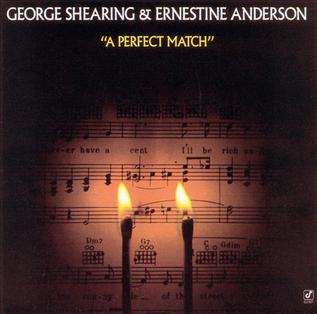
A Perfect Match is a 1988 album by jazz pianist George Shearing and the singer Ernestine Anderson. The pair had previously appeared together on Shearing's 1988 live album Dexterity.

Dinah Sings Some Blues with Red is a studio album by singer Dinah Shore and vibraphonist Red Norvo and his quartet. It was released in 1960.

Sure Thing: The Jerome Kern Songbook is a 1994 album by André Previn and Sylvia McNair of songs by the composer Jerome Kern.

'S Awful Nice is an album by Ray Conniff and His Orchestra. It was released in 1958 on the Columbia label.


















